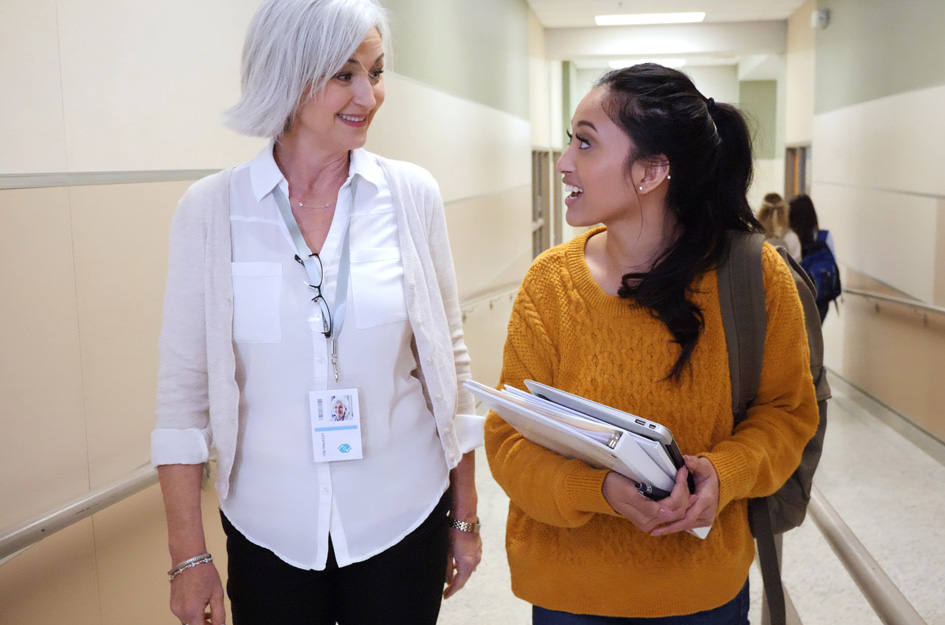There is a famous quote by Sir Isaac Newton that states, “If I have seen further, it is by standing on the shoulders of giants.” Even in 1675, Newton understood that we must build upon the wisdom and knowledge of those who came before us to succeed and grow.
Whether it’s helping someone find their passion, motivating and encouraging them to do better in school, or simply teaching a new skillset, mentors can open the eyes of youth to a future they never thought was possible.
Mentorship programs are proven to impact career development, self-esteem, and personal connections. The social support provided by mentors can decrease feelings of anxiety, depression and isolation that may have been brought on or heightened by the COVID-19 pandemic.
Here are four tips to being a magnificent mentor:
Make Time
A great mentor must be willing to spend time with their mentee(s). Cultivating a meaningful mentor-mentee relationship requires both parties to invest time and energy, but the results are worth it. The time spent together doesn’t have to constantly involve work! Spend time getting to know one another, discuss your values and passions, and reassure your mentee that you are their support system. Since the COVID-19 pandemic disrupted so many routines and relationships, a mentorship is a great way to create connection and reassure someone they are not alone.
Have a Plan
Once you’ve learned more about your mentee’s goals and passions, let that drive the content you curate for your time together. Create a list of achievable goals and discuss the steps and paths your mentee might take to achieve them. Breaking down long-term goals into smaller, more manageable ones reduces anxiety and fuels determination and empowerment.
Be Encouraging
A positive word and a consistent presence go a long way, especially for young people. As your mentee takes on opportunities and makes active decisions toward achieving their goals, let them know you see them taking action and you are excited for them. Encouragement is linked to positively impacting mental health and can help quiet those self-doubts that can prevent someone from trying new things or sharing thoughts and ideas.

Empower Development
As a mentor, it is important to both accept your mentee for who they are and recognize their want and potential for growth and development. Help them take on challenges and opportunities that broaden their worldview and sense of self and support them in making connections that get them closer to their goals. Through it all, the mentorship should be a safe space where your mentee feels supported and reassured, rather than judged.
Mentorship is more crucial than ever. As the world adjusts to the many impacts of the pandemic, it is critical youth have access to resources to help combat the pandemic’s effect on their mental health, as well as the impact of social injustice concerns.
To encourage mentorship opportunities for both adults and students, Papa Johns, Boys & Girls Clubs of America and The National CARES Mentoring Movement partnered together to select 10 Clubs to participate in a pilot mentoring program that acknowledges past trauma and gives space for courageous conservations. Participants ages 5 - 18 can discuss their heritage and culture, stress, and wellness in a safe, inclusive space in the context of their local community. 11-year-old program participant Serenity said, “The sessions have helped me understand and acknowledge the fact that everybody is different. I learned to do meditation. It gives me a peaceful day.”
Staff training is critical in helping both adult staff and the youth they work with in processing real emotions related to the impact of social injustice in local communities. Through funding from The Papa John’s Foundation, The National CARES Mentoring Movement provided specialized training for Club staff and Papa John’s volunteer mentors.
“At Papa Johns, we’re all about bringing people together,” said Jenn Garner, Director of Corporate Affairs & Sustainability. “We’re proud to support this program and help equip teens with the skills needed to thrive in today’s world. This is also a meaningful way for team members to give back to our communities by sharing their experiences and perspectives as volunteer mentors.”
Brian Walls, Salvation Army Boys & Girls Club Fuqua Unit Advisor, added, “The program has allowed [our youth] to express themselves honestly amongst their peers about homelife, school and personal feelings. They love the idea behind the nonjudgmental zone that allows them to speak freely.”
A good mentor has the power to change the life of another person and guide them to success. Programs like these not only provide adults with tools to become caring and passionate mentors, but also grant youth access to career development, academic, and social-emotional support from those who came before them.
Learn more about how Boys & Girls Clubs provide caring mentors to millions of kids and teens across the nation each year and find youth mentoring programs at a Club near you.




